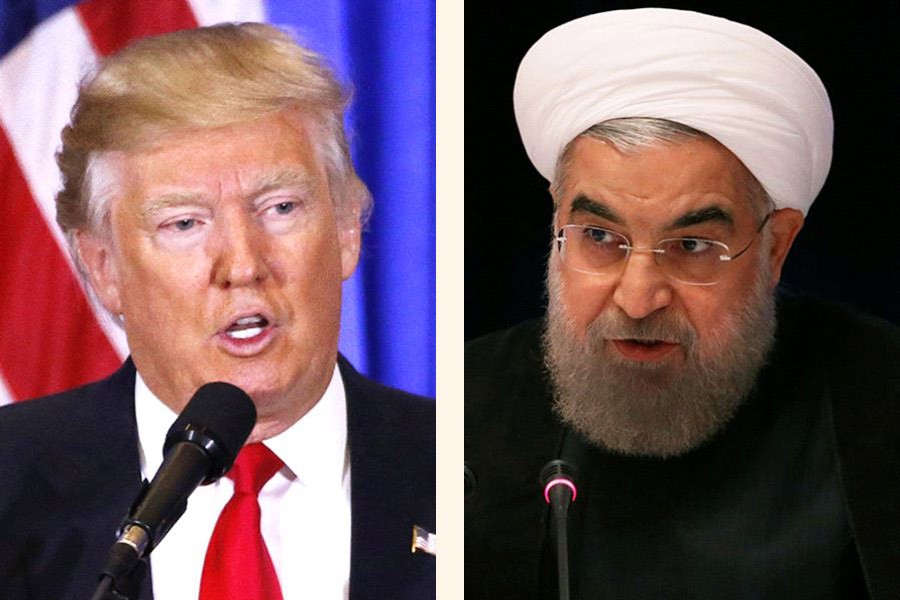US President Donald Trump has ended all speculations and confusions that his cryptic comments have created at times about the 2015 landmark Iran nuclear agreement. In a sharp policy shift, he chose not to certify that Iran is complying with the deal and warned that ultimately he might terminate it. Trump argues, the agreement is not in the interest of the United States.
In his speech last Friday (October 13), he announced a more aggressive approach to Iran over its nuclear and ballistic missile programmes and its support for what he calls "extremist groups in the Middle East". He reiterated that Iran is "not living up to the spirit" of the agreement and that his goal is "to ensure Tehran never obtains a nuclear weapon."
Analysts think that by taking the expected decision, the unpredictable president has firstly defied the thoughtful suggestions of his experienced political, diplomatic, military and intelligence advisers who preferred caution. Secondly, he has strengthened the hands of the rightwing opponents of Iran's moderate president Rouhani led by the Islamic Revolutionary Guard Corps (IRGC) and ignited a dangerous and hitherto unpredictable new ball game. The IGRC have always been opposed to the nuke deal as they believe that the opening of Iran to the world places the regime "on the slippery slope to regime change."
As expected, Trump's hardline remarks were criticised by Washington's European allies but drew praises from Israel and Saudi Arabia for his "courageous decision". However, interestingly enough, former Israel prime minister Ehud Barak told CNN that the Iran nuclear agreement was "a done deal" and admitted that its cancellation would help Iran out and put both the US and Israel in trouble. Barak, however, made it clear that he, too, was opposed to the agreement with Iran brokered by six nations - Britain, China, France, Germany, Russia and the US - and the European Union.
WHAT IS GOING TO HAPPEN? Russia slammed Washington's unilateral action and ruled out renewals of the UN sanctions. In his response, Iranian president Hasan Rouhani said on live television that "Tehran was committed to the deal" and accused Trump of "making baseless allegations."
Following the Trump announcement, the US Secretary of State Rex Tillerson said that Trump does not seem to want to re-impose the sanctions. Instead, he wants the Republican-controlled Congress to fix what he considers "flaws in the agreement." But that is most unlikely to happen because the Iranian president and others have declared repeatedly that the nuke deal "is not open for correction."
The ball is now in the court of the US Congress, and it has to decide in the subsequent 60 days whether to re-impose sanctions against Iran waived under the nuclear deal. Of course, the Congress has also the option of either doing nothing and mark time.
European Union foreign policy chief Federica Mogherini in Brussels stated that Washington cannot unilaterally cancel the agreement. Mogherini, who chaired the final stages of the landmark talks, said: "We cannot afford as the international community to dismantle a nuclear agreement that is working…. This deal is not a bilateral agreement."
After the Trump announcement, the chief of the International Atomic Energy Agency (IAEA) chief reiterated on October 13 that Iran was under the world's "most robust nuclear verification regime". Even before that the UN watchdog has repeatedly said that Iran has strictly complied with the agreement.
The nuke deal had faced severe test at the beginning of the last month's UN General Assembly session as the European signatories to the deal tried to pursue the Trump administration to keep it in place while the powerful Israeli lobbies opposed it. Apparently, the Israeli lobbies won over the concerted efforts of the Europeans. It does not seem to augur well for the maintenance of global peace and harmony.
UNFAVOURABLE GLOBAL REACTION: As expected, Washington's European allies rallied round the nuke agreement and leaders of Britain, France and Germany in a statement reaffirmed their commitment to the 2015 deal and warned the US against taking any decision that could harm it such as re-imposing sanctions.
Meanwhile, when the Trump plan for decertifying the nuke deal was made known by the mainstream US media late last month, German Chancellor Angela Merkel, Europe's undeclared leader, took the initiative to urge President Trump not to kill the agreement and said the nuke deal was a remarkable document and should be given a chance to prove its bona fides. However, given the mutuality of their dislike for each other, Merkel's pleadings failed to evoke a responsive chord for harmony.
Reuters news agency quoted a senior French diplomat during the UNGA session in New York as saying that the nuke deal was achieved in large part because it was not linked to all the other grievances the United States may have had against Iran. However, Obama must have been aware of this before agreeing to clinch the historic deal.
The French news agency AFP reported from Tehran that President Hasan Rouhani on October 11 lashed out at his US counterpart saying that he was opposing "the whole world" by trying to abandon a landmark agreement.
He said at a cabinet meeting which was shown live on state television: "If the US wants take a hostile position regarding an international agreement which is approved by the UN Security Council …. they will oppose not just Iran but the whole world…. It will be absolutely clear which is the lawless government."
The AFP report pointed out that other parties to the deal - Britain, France, Germany, China, Russia and the European Union - have all voiced staunch support for the agreement, saying Iran has stuck to its commitments to curb its nuclear programme. Separately in a report, the IAEA has also cleared Iran of its compliance of the agreement.


